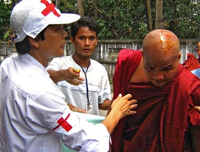




BANGKOK—Burmese security forces opened fire on protesters and onlookers with live ammunition and tear gas Wednesday, killing at least three people, including one monk.
Troops and police had moved in to secure the former capital Rangoon following the imposition of a curfew Tuesday, after several weeks of anti-government protests led by the country’s Buddhist monks.
Eyewitnesses told RFA’s Burmese service they saw three truckloads of monks and protesters—around 200 people in all—entering the notorious Insein prison in the city. Independent sources reported at least three deaths, including one monk and two lay people.
During the day, tens of thousands of ordinary people turned out onto the streets in the face of warnings from the military junta, in the biggest demonstrations seen in Burma in nearly two decades which have brought the city to a standstill, with major roads and communication systems at a standstill.
Much of the information coming out of the country was via ordinary citizens who posted video, photos and text accounts of the crackdown online.
Burmese blogger Ko Htike, a part-time worker in the emergency room at Rangoon General Hospital, reported:
“At about 2:00 p.m., five patients was coming to our emergency….for gun shots from government militaries,” he wrote, in what appeared to be a hurried posting on his blog Wednesday.
“One patient died on the spot on arriving at hospital…[shot on Bladder] 4 r still bad in Diagnosis.”
Witnesses described a scene in which the wounded were merely onlookers hit by random shooting from a truckload of soldiers on their way to the line of protesters.
“The patient’s attendant said ‘the patient r not in d line of protest... they [victims] are just chatting and watching d protest line and sitting on Cafe Bar near Shawe Dagon Pagoda , some r pedestrians,’” he wrote.
Two monks were beaten to death while another was shot when he tried to wrestle a gun away from a soldier and the weapon discharged, officials said.
They said the monks were killed near Rangoon’s Shwedagon Pagoda, Burma’s holiest site and a key rallying point during the last nine days of protests.
Several Burmese bloggers and Web sites were continuing to post photographs and videos of the crackdown despite online filtering by the government, with lists of proxy servers, a means of evading censorship, being passed around Burmese-language bloggers.
Other residents of Rangoon said they also heard gunshots, as the military closed in on the columns of monks and hand-holding protesters marching alongside to form a human shield.
“We all heard several gunshots,” a Chinese resident of Rangoon told RFA’s Cantonese service. “We aren’t sure exactly what the situation is. Because there was an announcement yesterday telling people not to go out on demonstrations.”
He said the authorities had warned everyone against protesting Wednesday, and many shops and businesses in the city had already shut down.
“There was a warning that anyone who did [protest] would be subject to enforcement of the law. Now, things are very tense. Everyone has gone home. None of the mobile phone networks is working,” said the man, who declined to be named.
A Chinese resident of Burma’s second city, Mandalay, said the curfew had also been extended there Tuesday.
“The curfew is for 60 days, from 9:00 p.m. to 5:00 a.m. It isn’t affecting the Chinese community very much. We are still going to work,” he said.
The United States and the European Union called on authorities “to stop violence and to open a process of dialogue with pro-democracy leaders,” including detained Nobel laureate Aung San Suu Kyi.
The G8 grouping of the world’s eight most industrialized nations condemned the violence and warned the generals that they would be held accountable for their actions.
British Prime Minister Gordon Brown, whose country is the former colonial power, said “the whole world is now watching Burma,” and French President Nicolas Sarkozy called on French businesses to freeze their investments here.
Wu Fan, editor-in-chief of the U.S.-based magazine Chinese Affairs, said he believes that Beijing doesn’t want Burma to become a focus of attention because of China’s own interest in the resource-rich country.
“It’s common knowledge that China is Burma’s biggest supporter. China gets oil, minerals, and timber from Burma. Of even greater significance is the strategic importance of Burma—through Burma, Beijing has direct access to the Indian Ocean. It is in Beijing’s interest that the situation in Burma doesn’t deteriorate, because if it gets out of hand, the U.S., Britain, and the United Nations will definitely become involved. Once that happens, China will lose its firm grip on Burma.”
Wu also said that with the 17th Communist Party Congress just around the corner, along with the 2008 Olympic Games in Beijing, China won’t want turmoil in its backyard—especially a democratic movement that may give ideas to like-minded activists in China.
Original reporting by RFA’s Burmese service. Director: Nancy Shwe. Additional reporting in Cantonese by Lillian Cheung Lai-ming. Cantonese service director: Shiny Li. Mandarin service director: Jennifer Chou. Translated and written for the Web in English by Luisetta Mudie. Executive director: Susan Lavery. Edited by Khin May Zaw and Sarah Jackson-Han.